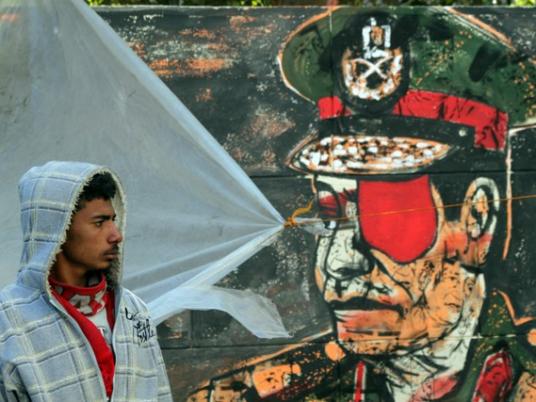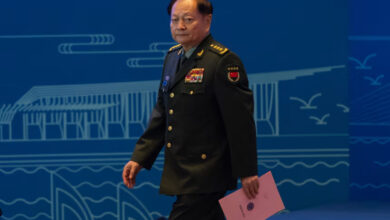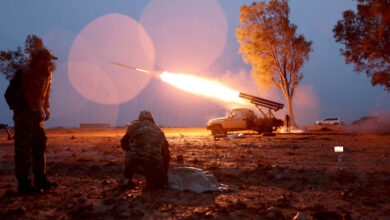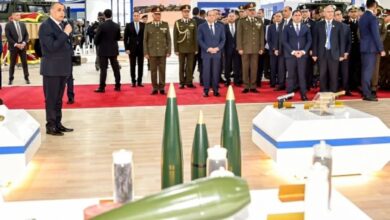
In the lead-up to the first year anniversary of the 25 January revolution, calls have intensified for a swift handover of power from the ruling military council to a civilian authority.
There are two main propositions that have been put forward by activists and politicians. One suggests that the military hand over power to parliament once elections are completed in January. Another proposal is to hold presidential elections in April, earlier than originally planned, and allow the nomination of presidential candidates to begin on 25 January.
Both propositions, however, are being ignored by the ruling Supreme Council of the Armed Forces (SCAF). And while the proposals reflect activists’ desire to end military rule as soon as possible, there are questions about their political feasibility.
Shortly after it took power last February following the resignation of former President Hosni Mubarak, the SCAF promised to end the transitional period within six months. At the time, the council denied what it called “rumors” that presidential elections would be postponed to 2012.
But following a referendum held in March on constitutional amendments, the SCAF issued a constitutional declaration scheduling parliamentary elections for September, followed by the drafting of a new constitution within a year. That means that presidential elections could come as late as 2013.
Amid growing criticism of military rule, Field Marshall Hussein Tantawi delivered a speech in December, announcing that presidential elections would take place no later than June 2012.
“The initiatives to speed up the transition of power are meaningless. There is a clear plan set with precise steps. We need to be calm and to take the timeline set seriously,” says Hassan Abu Taleb, a political expert at Al-Ahram Center for Political and Strategic Studies. Abu Taleb believes the timeline set by the military council is already compressed and attempts to shorten it more could cause an unnecessary crisis.
Activists pushing for a faster transition of power, however, believe that six more months of military rule could irreparably damage relations between the people and the army.
“We need to preserve the military; it has already lost a lot by being in politics and being in confrontations with the people,” says Shady al-Ghazaly Harb, president of the Awareness Party, which supports the initiative to expedite the transfer of power to the elected parliament.
The April 6 Youth Movement–Democratic Front is leading the campaign to hold presidential elections early.
“The government was able to manage the parliamentary elections well so they are able to hold the presidential elections as soon as possible,” says Tarek al-Khouly, a member of the group. He adds that April 6 has contacted many presidential candidates who expressed their readiness for early elections, but prefer not to announce that publicly for the moment.
A campaign titled “Revolution of the people, power of the people,” supports the initiative through street activities.
Supporters are calling for the immediate transition of power to the speaker of parliament, who would be required to call for presidential elections within 60 days.
Following the landslide victory of Islamist parties in parliamentary elections, another version of the initiative has been suggested in order to limit Islamists’ grip on power. The modified initiative calls for the speaker of parliament to form a committee representing all political groups. The committee would run the affairs of the country until elections were held in 60 days.
“The parliament speaker will give legitimacy to the initiative because he’s elected,” says prominent activist George Ishaq, a supporter of the modified version of the initiative.
Recently released activist Alaa Abd El Fattah, who had been detained by the military on charges of inciting violence against the army, said at a discussion held last week that not only should the military swiftly withdraw from politics, but that the timeline set by the military rulers should be changed.
“We need to initiate instead of being reactionary all the time,” said Abd El Fattah. “In the presence of an elected body, there is no need to have people in power that were appointed by Mubarak,” he added, alluding to the strong connection between the SCAF and the toppled president.
Elected MPs Amr Hamzawy and Mostafa al-Naggar, who originally called for the transition of power to parliament, have also put forward a timeline that would have presidential elections take place in April. Their proposal has also been ignored by the SCAF.
The Muslim Brotherhood’s Freedom and Justice Party, which has won the most seats of any coalition in the upcoming parliament, has rejected all early handover initiatives, claiming it's best to stick to the SCAF's proposed timeline for a handover in July.
In the meantime, the Brotherhood is focused on negotiating the SCAF's exit from power, a process that includes the challenges of safeguarding the military's economic and political privileges. Other political forces believe that these privileges need to be contested.
History professor and political analyst Sherif Younis believes that a constitution which determines the balance of power among state institutions is a crucial precursor to presidential elections. Without a constitution that states the powers of the president, Younis says, early presidential elections may present problems by granting a president unlimited powers while the constitution is being drafted.




